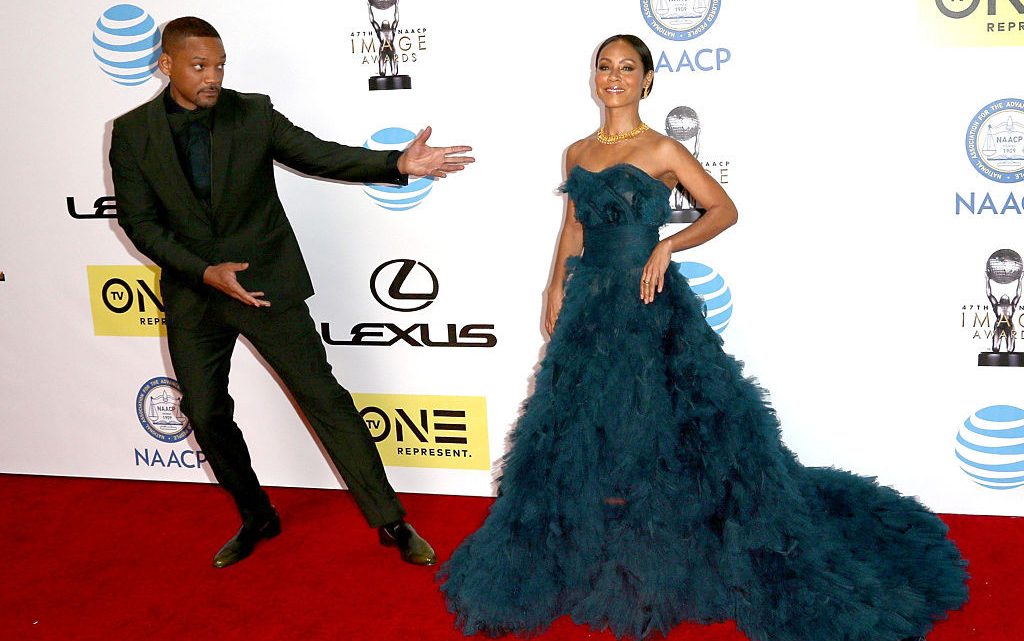
The Smiths Reinvented Celebrity Social Media with a Purpose
November 7, 2018Almost a year ago Will Smith took the internet by storm after opening an Instagram account and YouTube channel (now with a cumulative 28 million followers). Fans quickly noticed his pages aren't your average celebrity social accounts. No flat tummy tea ads or incessant barrage of promo posts. With his drone and a personal camera crew close behind, the once Fresh Prince bungee-jumps from a helicopter, dances with Mark Anthony, tackles his fear of scuba diving, and climbs to the top of a bridge to outdo all other “In My Feelings” challenge videos. He's having the best time, and in doing so, he’s also finally indulging fans in his larger-than-life personality, bridging his trademark silly humor with his fatherly persona.
It took the launch of his social channels for many fans to realize we actually hadn’t seen much of the off-screen Smith in his career despite his omnipresence as a television and movie star. We weren’t starved for images of him and his famous family, but this new solo-time he’s curated opened up a new perspective on a (sorry, Will) now older figure.
Then, five months after Smith’s YouTube show started, his wife Jada Pinkett-Smith launched her own DIY show on Facebook called Red Table Talk, which she hosts with her mother, Adrienne Banfield-Jones, and daughter, Willow Smith. The three women have their own touching dynamic amidst the larger Smith family conglomerate. Their four million followers have gotten to benefit from their refreshing approach to intergenerational conversations and universal topics around motherhood, childhood, sex, and gender. In an interesting touch, the men in their family, like Jaden and Smith, are relegated to guest spots. This is about the women.
Red Table Talk often splashes into the news when high-profile figures spill their secrets, sometimes with lighthearted gossip like when Tiffany Haddish complained about Drake standing her up on a date, but more often when Jada talks through her fractured relationships with people like Gabrielle Union or Will's first wife Sheree Zampino. Jada often uses the show for a personal catharsis as the audience also benefits from seeing her work through painful memories with guests. The show has been particularly impactful in the black community where Jada has long-been a beloved cultural figure as twitter unpacks the stand-out moments from each episode, sometimes joking about taking notes from Will and Jada's relationship, and in other moments striking a sincere tone of appreciation for its consistent honesty and insightfulness.
The two shows are similar in that long-time private A-list celebrities share the three-dimensional version of themselves for a greater good. But the way they chose to re-engage with the public is pretty different from most famous families. They didn’t need to let fans into their world to build toward any obvious business goals, as with the Kardashians. The Smiths could have easily gotten a network reality show about their family if they wanted one, or could have just settled for having active social accounts, as so many celebrities do. But this extra step of separately producing their own content at the same time begs the questions: Why now and why in this way? Smith has said before that he thought for a long time you had to be private in order to be a successful movie star, but his appearance on Jada’s show seemed to hold a better answer.
On a recent episode of Red Table Talk, Will came on to talk about his and Jada’s marriage and it quickly became apparent where their renewed individual energy is coming from. The two recounted that for the majority of their marriage Smith was obsessively bending the family toward his ambitious vision of success, often ignoring Jada’s interest in a less glitzy, calmer lifestyle. After she spiraled into periods of depression, they separated for two years (without divorcing) to find individual happiness. And now they don’t call themselves married. Instead they focus less on building their life as a unit and more on supporting one another’s individual notions of happiness. At the end of the emotional conversation, Smith acknowledges that the space Jada created with her show is the happiness he’d always wanted her to have but that he learned he couldn’t build for her. The story helped explain why the two once billed themselves as a duo, like when they hosted the BET awards together in 2005, and why they’re now re-engaging with the public separately. But it also adds a certain gravity, particularly to Jada’s show, to know that the moving, insightful moments she’s creating in her female-centric show are a product of freeing herself from the depression of living Will’s vision for their life.
In this context, both of their shows seem to be the outgrowth of their new perspective on life. They’re interested in sharing their personalities and insights with the world as individuals, and that’s largely why the shows are so electric. There’s a certain urgency and personal feel to them as Smith enthusiastically reflects on the morals of his childhood stories and uses his channel as an excuse to tackle his extravagant bucket list. Meanwhile, Jada frequently invites guests on to talk through their real-life relationship struggles, pointing the conversation outward as general advice for viewers who can relate and simultaneously find their own catharsis through the conversation.
Jada expertly chooses celebrity guests but moves the conversation quickly away from fame and promoting projects, using their voices to give life to the thought-provoking, healing topics she wants to champion. Even when the conversation stays among Jada, Willow, and Banfield-Jones, they discover new things about one another, and the audience sees mothers and daughters treating each other like peers and discussing issues that typically divide generations. It’s striking, for example, to see Willow tell her mother and grandmother for the first time that she used to cut herself, or to watch Banfield-Jones unpack her former sex life without Jada and Willow squirming.
While the Smiths may run with the rest of the Hollywood circuit, they’re charting a noticeably different path than other famous families. Self-promoters like the Kardashians are brand-builders to the core that primarily use their reality show for businesses and entertainment purposes. The Smiths certainly shoutout their family members’ projects (Including Jaden’s box water company Just Water), and their shows undoubtedly help their brand, but there’s a deeper function to share the lessons they’ve learned over the years. The stories they tell don’t always make them look like the good guys, but they feel honest. Other famous family-led reality shows, like Run’s House, have had light recurring plot lines of family members learning lessons, ending each episode on a moral. But their neatly wrapped episodes are usually underscoring low-stakes, semi-comedic storylines similar to scripted family sitcoms (like when Rev Run was convinced to change his wardrobe, or when the family tries to eat healthier).
The Smiths are a very introspective family that see the value in resurrecting and dissecting their bigger demons to share with the world. They could have enjoyed their fame and success in private, or engaged with the public without breaking the news of their own two-year separation. But thank goodness for their new path because they're great storytellers on a journey to live uninhibited. They find themselves on the precipice of a number of issues our society, and certainly the black community, grapples with: reclaiming freedom within a life partnership, progressive parenting styles, intergenerational understanding among women, and young people pushing their own visions of gender and sexuality, just to name a few. In an age of oversharing, they’ve managed to share more with a necessary purpose, leaving us to hope other celebrities with resources and value to add will follow suit.
Sign up for our newsletter to get the best of VICE delivered to your inbox daily.
Follow Taylor Hosking on Twitter.


